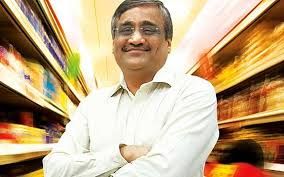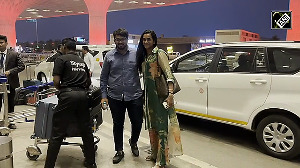 Kishore Biyani, following the online discount fest that marked the season, has alternated between criticising an e-commerce portal (Flipkart) for undercutting and tying up with another (Amazon) to sell some of Future Group's private labels.
Kishore Biyani, following the online discount fest that marked the season, has alternated between criticising an e-commerce portal (Flipkart) for undercutting and tying up with another (Amazon) to sell some of Future Group's private labels.
But Biyani's discount chain, Brand Factory, is putting up an unaffected front. While e-commerce portals spread an unease among offline retailer of all colours and stripes, Brand Factory's business head, Suresh Sadhwani, says that an all-year discount chain is better placed than portals to win at the discounting game.
"The market is too big (for us) to be affected by online sales. Besides, Indian customer still wants to come and experience the product, that's where we matter," Sadhwani says. He says that Brand Factory, wuld not, in fact, look to sell online.
Sadhwani, however, adds that e-commerce players buy merchandise in bulk from brands, creating supply issues for brick and mortar discount formats, though he labels it as a temporary challenge.
Competing with the likes of Arvind's Megamart and Loot, it follows the model of selling branded apparel and accessories that find their way to these formats after the biannual sales in regular multi-brand and single-brand stores.
Besides discounting brands between 20 and 50 per cent, it also sells its own private labels.
| 365-DAY DISCOUNTING |
|
In 2012, Biyani mentioned his intention to double, in three years, the business of the remaining multi-brand formats that he was left with after selling off Pantaloons to Aditya Birla Group, namely Central and Brand Factory.
Company sources claim that Brand Factory is growing at around 15 per cent. Sadhwani affirms, "We are opening new stores and doubling topline will not be a problem."
The chain is now spreading its wings. Having consolidated its presence in the south with its acquisition of a regional discount chain, Coupon, which added 10 more stores taking its count to 39 stores in the south.
"So far, we have built a strong presence in the south. Now we are looking to expand in the east and west. Coupon helped up scale u quickly instead of waiting for six-eight months for a store to gain traction," says Sadhwani.
Planning about 10 stores in a year, it would open shop in places such as Kozhikode, Patna and Surat.
On the other hand, Brand Factory's offline rival, Megamart is changing its business model from discount-led stores to value stores.
"With the new Megamart stores, we are not dependent on brands. The cash conversion cycle is better," says a senior official with the chain.
It seems that rather than discounting in othe channels, the supply chain issues in the existing offline discount chain are a bigger problem for players like Brand Factory.
For a discounting chain, having more of third-party brands don't make for a profitable model.
"How will you make money?
Brands are not giving discounts and if you offer high discounts, you have to take a hit on margins.
Having more of own brands makes sense," says a CEO of another retail chain, who declined to go on record.
Susil Dungarwal, former CEO of discount chain Loot, which has battled challenges of its own, says that Brand Factory resisting going online would work in the short to mid term.
It needs to upgrade its brand mix and come up with new brands of its own to cater to a wider audience and reduce dependence on external brands.
Thirty-seven per cent of Brand Factory's merchandise is made up of its own labels and it wants to take the share to 45 per cent, that would more of the margins that range from 40 to 45 per cent.
Sadhwani says, "See, shoppers walk in to buy big brands and not only private brands, so we can't completely go with private labels alone." Brand Factory is also coming up with seasonal lines.
For instance, for the next season, it is coming up with an entire line of Daniel Hechter, a French brand retailed by Future Lifestyle Fashions.
Devangshu Dutta, chief executive of Third Eyesight, says if offline retailers provide discounting similar to online retailers, shoppers will buy from the former.
"With online sellers, there is always a chance of inconsistency with the products as seen online.
"What is shown is not what you get many times. E-commerce is still a small segment of the market. The players are spending a lot of money but the percentage of sales in phyiscal stores is still larger," says Dutta.
Image: Kishore Biyani












 © 2025 Rediff.com -
© 2025 Rediff.com -